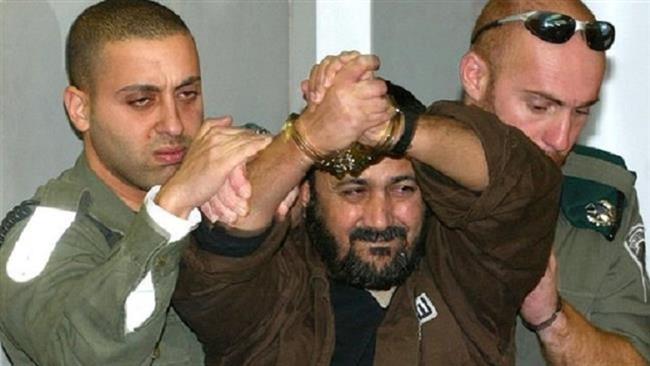
RNA - Head of the Palestinian Committee of Prisoners’ Affairs Issa Qaraqe announced the news on Monday, adding that Barghouthi, 57, was suffering from a severe drop in blood pressure and blood sugar levels.
Since April 17, over 1,500 Palestinian prisoners from across the political spectrum have gone on a mass hunger strike, initially called for by Barghouti, in protest at the conditions of Israeli prisons.
The Israeli regime has sentenced Barghouthi, a top leader of the Palestinian Fatah Movement, to serve five life terms in prison over his role in the Palestinian Intifada (Uprising). The Israel Prison Service (IPS) has placed him in solitary confinement following the initiation of the strike eight days ago.
On last Wednesday, IPS spokesman Assaf Librati announced that Barghouti had been transferred from Hadarim Prison to the Kishon Prison, near Haifa.
The IPS has continued to punish the hunger-striking detainees by placing them in solitary confinement and denying family and legal visits by their lawyers since the strike began on Palestinian Prisoners’ Day.
Earlier on Monday, dozens of families and supporters of hunger strikers marched through the streets of the occupied West Bank city of Ramallah, to express their dissent against the IPS authorities and to express their solidarity with the inmates and praise their strike.
Dozens of others flew kites and balloons, carrying photos of Palestinian inmates, in the vicinity of the Ofer prison in the West Bank.
"This activity was organized near the (Israeli) occupation's Ofer prison to send a message to prisoners telling them that our people are supporting them," said one of the organizers.
Israeli prisons hold around 6,500 Palestinians, including 300 minors. Some of the inmates are held under Tel Aviv’s policy of administrative detention, which enables confinement without charge.
Palestinian inmates regularly stage hunger strikes in protest at the administrative detention policy and their harsh prison conditions.
847/940